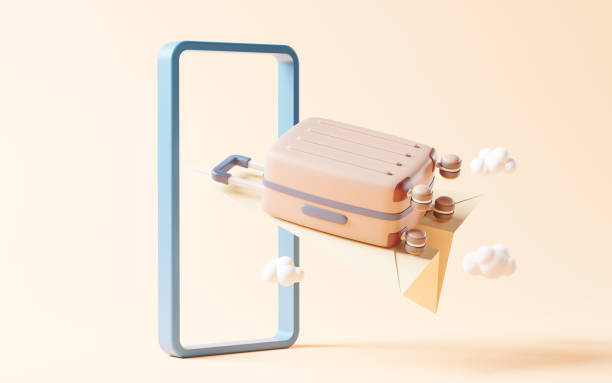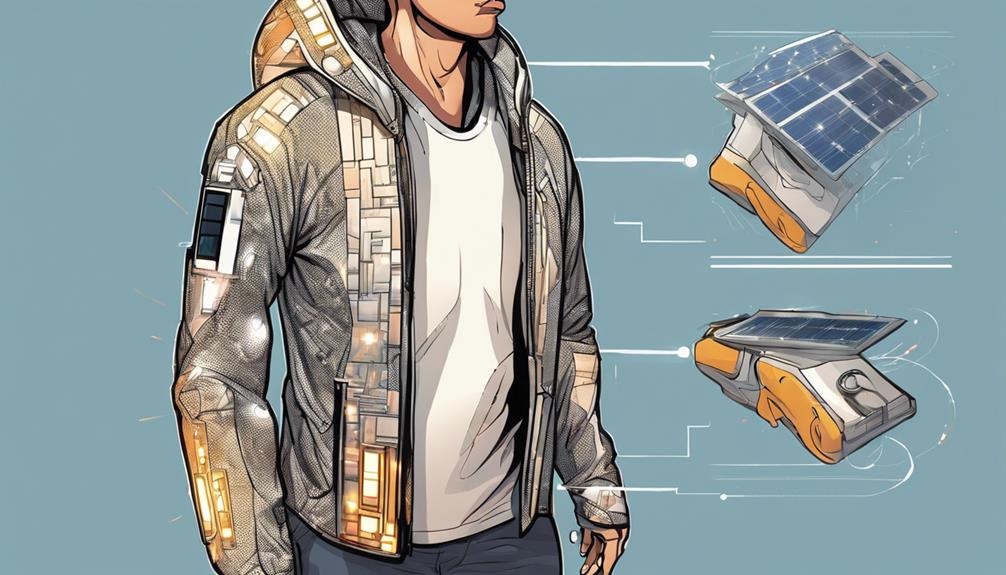
Smart Luggage: The Travel Game-Changer Revolutionizing Your Journey
From GPS tracking to biometric locks and built-in charging, discover how smart luggage is reshaping travel with cutting-edge features, unmatched convenience, and a new standard for global mobility.
✨ Raghav Jain

Introduction: A New Era of Travel
Travel is undergoing a profound transformation, not just in destinations or experiences but in the tools we use to navigate the world. One of the most disruptive innovations in modern travel is the rise of smart luggage—suitcases and bags embedded with technology designed to simplify, secure, and streamline travel.
Once a purely functional item, luggage has evolved into a tech-savvy companion offering connectivity, enhanced security, and convenience like never before. From Bluetooth-enabled location tracking to biometric locks, smart luggage is empowering travelers and transforming the travel industry.
This article delves deep into how smart luggage is changing travel forever—unpacking its benefits, exploring real-world applications, and analyzing industry trends and expert insights.
The Evolution of Luggage: From Leather to Smart
From Utility to Technology
Luggage has historically followed the arc of human innovation. From ancient wooden chests to rugged leather trunks and now to ultra-lightweight polycarbonate cases, its evolution mirrors the progress of travel itself. However, while materials and design improved, functionality plateaued—until now.
The integration of technology marks a radical departure from traditional luggage. With the boom in mobile technology, Internet of Things (IoT), and consumer demand for convenience, luggage manufacturers began embedding smart features to cater to modern travelers.
What Makes Luggage “Smart”?
Smart luggage refers to suitcases and travel bags equipped with integrated technologies that go beyond simple storage. Common features include:
- GPS/Bluetooth tracking for real-time location updates
- Built-in USB charging ports and power banks
- Remote locking and unlocking systems
- Biometric authentication (fingerprint scanners)
- Proximity alerts and mobile app integration
- Digital weight sensors
These innovations are designed to eliminate common travel frustrations, making the entire experience more seamless and efficient.
Key Features and Functions of Smart Luggage
1. GPS Tracking: Never Lose Sight of Your Bag
Lost luggage is one of the most stressful parts of air travel. Smart luggage brands have addressed this issue by integrating GPS or Bluetooth-enabled location tracking that syncs with a mobile app.
With GPS tracking, travelers can locate their bags in real-time—whether it’s delayed at a layover airport or mistakenly rerouted. This feature is particularly valuable for frequent flyers, international travelers, and anyone with tight connections.
Some high-end models even offer geofencing features that alert you when your bag leaves a predefined zone.
2. Integrated Power Banks and USB Ports: Stay Charged
In today’s digital age, staying connected is essential. Smart luggage often includes built-in power banks and USB ports, allowing travelers to charge smartphones, tablets, or laptops on the go. Some even have wireless charging pads.
This is a game-changer for long layovers or remote travel where access to power outlets is limited. Some bags come with removable batteries to comply with airline safety regulations, a feature that is increasingly required by major carriers.
3. Biometric Locks and Remote Security
Security is a growing concern for travelers. Smart luggage has responded by integrating advanced locking mechanisms, including biometric fingerprint scanners and remote-controlled locks.
These features allow users to lock and unlock their luggage using an app or fingerprint, offering far greater protection than traditional combination locks. It also eliminates the risk of lost keys or forgotten combinations.
4. Built-In Scales: Avoid Overweight Baggage Fees
One of the most practical additions to smart luggage is the inclusion of digital weight sensors. Travelers can lift the bag by the handle, and a display shows the bag’s weight instantly. This helps avoid surprise fees at the check-in counter and ensures compliance with airline restrictions.
5. Proximity Alerts and Anti-Theft Systems
Smart luggage can be paired with a smartphone to send proximity alerts. If your bag is moving away from you, or someone tries to tamper with it, you'll receive a real-time notification. This feature is ideal for busy terminals, hotel lobbies, or anywhere theft is a concern.
Real-World Applications and Use Cases
Business Travelers: Time and Security Optimization
Business travelers frequently use smart luggage for its productivity-enhancing features. Having a mobile charging station, real-time location tracking, and secure storage for electronics makes it easier to move from one meeting to the next across cities and countries.
Digital Nomads: Portable Power and Connectivity
Digital nomads, who work remotely from anywhere in the world, rely heavily on power and secure transport for tech gadgets. Smart luggage enables them to charge devices while commuting and feel confident about the safety of their gear.
Families: Simplified Group Travel
Families traveling with children benefit from GPS-enabled bags that ensure luggage doesn’t get lost in transit. Features like auto-follow or app notifications can prevent chaos in crowded terminals.
The Market Landscape: Growth and Competition
The global smart luggage market has seen substantial growth in recent years, driven by increasing demand for tech-savvy travel solutions and a growing middle class.
Market Size and Projections
- The smart luggage market is projected to reach over $5 billion by 2028.
- Annual growth rate (CAGR) is estimated at around 20–25% through 2030.
- Asia-Pacific and North America are the fastest-growing regions due to tech adoption and travel frequency.
Major Players in Smart Luggage
Notable companies include:
- Samsonite – offers luggage with integrated tracking and charging solutions.
- Away – known for stylish designs with built-in USB charging.
- Travelpro – focuses on business travelers with smart functionality.
- Arlo Skye – provides luxury smart luggage with silent wheels and high-tech locks.
Challenges and Regulatory Hurdles
Despite its benefits, smart luggage faces several hurdles that slow widespread adoption.
Battery Regulations by Airlines
Due to fire hazards associated with lithium-ion batteries, airlines have implemented restrictions. Bags with non-removable batteries are banned from check-in by many carriers, pushing brands to redesign models with removable or compliant battery systems.
High Price Points
Smart luggage is significantly more expensive than traditional suitcases. With prices ranging from $200 to $800, it may not be accessible to all travelers. However, the convenience and functionality often justify the investment for frequent flyers.
Durability Concerns
Adding electronics can compromise the structural integrity of a suitcase. Consumers often worry about battery damage during rough handling or the longevity of the tech components over years of travel.
Sustainability in Smart Luggage Design
As the travel industry faces growing pressure to embrace sustainability, smart luggage brands are innovating in eco-conscious ways.
Eco-Friendly Materials
Several companies are developing bags using recycled plastics, aluminum, and biodegradable materials. These not only reduce environmental impact but also appeal to eco-conscious consumers.
Solar Charging Capabilities
Some smart luggage now includes solar panels to power devices, reducing reliance on traditional power sources. This is particularly beneficial for remote or adventure travelers where conventional charging isn't an option.
Modular Designs
Innovative brands are exploring modular luggage where individual tech components can be replaced or upgraded without discarding the entire suitcase. This promotes longevity and reduces electronic waste.
Smart Luggage Across Travel Segments
Luxury Travel: A Premium Tech Experience
Luxury travelers demand not only elegance and exclusivity but also convenience and innovation. Smart luggage offers an elevated experience by combining sleek design with sophisticated tech.
Luxury brands are now integrating AI-driven services into their travel gear. For example, some luggage lines can sync with concierge apps, provide personalized travel recommendations, and even adjust interior compartments automatically based on pre-programmed needs. Travelers who stay in premium hotels or fly first-class expect their accessories to reflect their lifestyle, and smart luggage is now becoming a status symbol.
Moreover, luxury luggage often includes touchscreens, digital locks, and ultra-silent wheels, making it as smooth and silent as a luxury car ride.
Budget Travelers: Value and Functionality
Though initially associated with high-end consumers, smart luggage has started reaching the budget travel market as prices decrease. Affordable brands now offer stripped-down smart features like detachable power banks, built-in scales, or Bluetooth trackers.
For budget travelers or backpackers, the main appeal lies in practicality—no more scrambling for charging stations or wondering if a checked bag will make it to the next city. Basic smart features offer tremendous value even without bells and whistles.
Low-cost smart luggage is especially popular with younger demographics—millennials and Gen Z—who are more tech-savvy and expect technology to be seamlessly integrated into everyday products.
Adventure and Outdoor Travel: Rugged Meets Smart
Adventure travelers, hikers, and off-the-grid explorers can now benefit from smart luggage features tailored for rugged conditions. Brands are beginning to combine the durability of outdoor gear with smart capabilities like solar charging, GPS beacons, and temperature-regulated compartments.
Imagine hiking into a remote area while your smart backpack tracks your location, monitors your gear’s internal temperature to protect sensitive electronics, and allows emergency communication via satellite. The possibilities for safer, smarter exploration are expanding rapidly.
Innovations Powering the Next Generation of Smart Luggage
AI and Predictive Assistance
Artificial intelligence is poised to make luggage smarter than ever. In the future, smart bags may use predictive AI to help travelers pack more efficiently. Based on weather forecasts, location data, and itinerary, your luggage might suggest what to bring—or even send reminders through your smartphone.
AI could also help with route planning within airports, offering directions to gates, lounges, and baggage claims using augmented reality overlays via a connected app.
IoT Integration: Luggage That Talks to Everything
The Internet of Things (IoT) connects physical devices to each other and the internet. In the context of smart luggage, IoT integration could mean seamless interaction with airport infrastructure.
For instance, your bag could communicate with airport systems to update its location in real time, notify you of delays in baggage claim, or automatically update your airline with location pings if it’s misplaced.
Some prototypes are already exploring IoT-linked environments, where your suitcase could "talk" to your hotel, check you in, or confirm the delivery of your luggage to your room before you arrive.
Biometric and Blockchain Authentication
To improve identity verification and theft prevention, future smart luggage may incorporate biometric sensors that authenticate the user with facial recognition or voiceprint. Access to your luggage might be granted only if a biometric match is confirmed, making physical theft or tampering far more difficult.
In addition, blockchain-based tracking can create a tamper-proof record of your bag’s journey from check-in to arrival. This immutable log adds an extra layer of security, particularly in high-risk areas or with valuable contents.
Modular Ecosystems: Build Your Own Smart Luggage
Modular design is becoming increasingly popular, allowing users to customize their luggage to their needs. Imagine selecting different tech modules—solar panel, extended battery, GPS tracker, scale, or biometric lock—and assembling them into your travel gear.
This ecosystem approach allows frequent flyers to adapt their luggage for different types of trips—short business hops, long international stays, or adventure travel—without investing in multiple bags.
Real-World Case Studies and Use Stories
Business Executive in Tech: James from San Francisco
James is a global software consultant who flies internationally at least twice a month. His smart suitcase from a leading brand includes GPS tracking, a digital lock, and a built-in 20,000mAh power bank. During one chaotic week, his luggage was misrouted in Singapore—but using the GPS tracker, he pinpointed its exact location and recovered it within hours.
The ability to secure his laptop, access charging while on the go, and stay informed without relying solely on the airline helped him keep his schedule intact and reduced stress.
Solo Female Traveler: Priya from London
Priya travels solo frequently through Europe and Southeast Asia. Her smart backpack includes biometric access, proximity alerts, and a solar charger. In a crowded terminal in Barcelona, her phone buzzed with an alert that her backpack was moving away. It had been mistakenly picked up by another passenger. The alert allowed her to intervene before it was lost.
She credits her smart bag with helping her feel safer and more in control while traveling solo—especially in unfamiliar environments.
Family Travel Story: The Millers from Toronto
The Miller family travels with two children under 10. Their smart luggage includes GPS tracking and removable batteries that double as entertainment power stations. Each child’s bag has a color-coded light strip and a tracker linked to their parent’s app. During a trip to Disney World, one child’s suitcase was mistakenly left on a shuttle—GPS tracking helped locate it quickly.
By reducing worry and streamlining logistics, smart luggage made family travel smoother and more enjoyable.
Customer Feedback and Market Response
Consumer reviews and market studies show overwhelmingly positive feedback for smart luggage—especially regarding convenience, peace of mind, and travel efficiency.
Top-Rated Features by Consumers:
- Tracking: Most valued by consumers, especially for air travel and international trips.
- Charging: Essential for business travelers and tech users.
- Security: Biometric and app-controlled locks rate high in consumer trust.
- Weight scales: Appreciated for avoiding baggage fees, particularly with budget airlines.
Common Criticisms and Challenges:
- Battery regulations: Some consumers are frustrated by confusion over airline policies.
- High prices: Premium smart luggage still costs significantly more than traditional options.
- Durability concerns: Users question the longevity of tech components under rough handling.
Despite some drawbacks, surveys show that more than 70% of frequent flyers are interested in upgrading to smart luggage within the next two years.
The Changing Role of Airports and Airlines
Airports as Smart Luggage Hubs
As smart luggage grows in popularity, airports are adapting. Some have begun integrating smart bag tracking into their internal systems, allowing passengers to sync their personal devices with airline logistics in real time.
Interactive kiosks now help scan, weigh, and track smart luggage, bypassing long check-in lines. Future airports may offer tech support counters to assist with connectivity or maintenance of smart travel gear.
Airline Partnerships and Integration
Airlines are beginning to form partnerships with smart luggage manufacturers. These collaborations aim to streamline check-in, enable real-time bag monitoring, and minimize lost luggage.
Airlines may soon offer dedicated perks for smart luggage users—such as express check-in, automated alerts, or integration with travel apps that allow for smoother baggage handling and faster claim processes.
How Smart Luggage Reflects a Bigger Shift in Travel Culture
Travel is increasingly driven by personalization, automation, and technology integration. Smart luggage is both a product and a symbol of this cultural shift.
It represents:
- Control: Travelers now expect real-time access to everything, including their belongings.
- Convenience: Long lines, lost bags, and dead batteries are no longer acceptable.
- Convergence: The merging of fashion, function, and technology in a single travel accessory.
Smart luggage isn’t just a tool—it’s a travel philosophy. It embodies the desire for a seamless, empowered, and connected experience.
Conclusion
Smart luggage is more than a passing trend—it’s a major milestone in the evolution of modern travel. As the world grows more interconnected, travelers increasingly demand convenience, control, and security. Smart luggage rises to meet those demands by integrating technology into one of the most essential travel companions: the suitcase.
From GPS tracking that ensures you never lose your bags, to built-in power banks that keep devices charged on the go, smart luggage addresses real-world pain points. Business travelers, families, digital nomads, and even luxury adventurers all benefit from this wave of innovation.
Moreover, smart luggage reflects the broader transformation of travel culture—where personalization, safety, and seamless experiences are paramount. As AI, IoT, and biometrics continue to evolve, we can expect even more intuitive and powerful features in future iterations.
However, this innovation does come with challenges: regulations regarding battery usage, higher costs, and some durability concerns. But as technology becomes more accessible and affordable, these hurdles are likely to diminish over time.
Smart luggage is reshaping how we pack, move, and think about travel. It’s no longer just about getting from point A to B; it’s about how smartly, safely, and efficiently we get there. As the industry matures, travelers can expect even greater autonomy, customization, and ease from the bags they trust to carry their world.
Q&A About Smart Luggage
Q1: What exactly is smart luggage?
A: Smart luggage refers to suitcases and travel bags integrated with advanced technology, such as GPS tracking, USB charging ports, biometric locks, and digital weight scales, designed to enhance convenience and security while traveling.
Q2: Can smart luggage be checked in on airplanes?
A: Yes, but many airlines require the batteries to be removable due to safety regulations. Always check airline guidelines before flying with smart luggage.
Q3: How does GPS tracking in smart luggage work?
A: It uses GPS or Bluetooth technology to send location data to your smartphone via a connected app, allowing you to monitor your bag’s real-time location anywhere in the world.
Q4: Is smart luggage allowed in all countries?
A: Most countries allow smart luggage, but regulations on battery-powered devices vary. It’s best to verify local airline policies and transportation laws before international travel.
Q5: Does smart luggage require internet connectivity?
A: Some features like GPS tracking require cellular or Wi-Fi networks, while others like built-in scales or locks work offline through Bluetooth.
Q6: What happens if the smart luggage battery dies?
A: Core luggage functions (like carrying clothes) remain unaffected. However, smart features such as charging and tracking won’t work until the battery is recharged or replaced.
Q7: Are there budget-friendly smart luggage options?
A: Yes, several brands now offer affordable models with essential smart features like tracking or USB charging, making it accessible to a wider range of travelers.
Q8: Can smart luggage be used for business travel?
A: Absolutely. Business travelers benefit from built-in charging, secure compartments, and app-based controls, helping them stay productive and organized during trips.
Q9: Is smart luggage durable enough for rough handling?
A: Reputable smart luggage brands use strong materials like polycarbonate and aluminum. However, the tech components can be vulnerable, so choose models with good warranty coverage.
Q10: What’s the future of smart luggage?
A: The future includes AI-powered assistants, auto-follow technology, blockchain security, and customizable modular designs—all pointing to smarter, more interactive travel experiences.
Similar Articles
Find more relatable content in similar Articles

AI in Drug Discovery: Faster C..
Artificial Intelligence is rev.. Read More

Solar-Powered Wearables: Can T..
Solar-powered wearables are re.. Read More

Smart Cities: How Technology I..
Smart cities are transforming .. Read More

Wearable Health Sensors: The D..
Wearable health sensors are re.. Read More
Explore Other Categories
Explore many different categories of articles ranging from Gadgets to Security
Smart Devices, Gear & Innovations
Discover in-depth reviews, hands-on experiences, and expert insights on the newest gadgets—from smartphones to smartwatches, headphones, wearables, and everything in between. Stay ahead with the latest in tech gear
Apps That Power Your World
Explore essential mobile and desktop applications across all platforms. From productivity boosters to creative tools, we cover updates, recommendations, and how-tos to make your digital life easier and more efficient.
Tomorrow's Technology, Today's Insights
Dive into the world of emerging technologies, AI breakthroughs, space tech, robotics, and innovations shaping the future. Stay informed on what's next in the evolution of science and technology.
Protecting You in a Digital Age
Learn how to secure your data, protect your privacy, and understand the latest in online threats. We break down complex cybersecurity topics into practical advice for everyday users and professionals alike.
© 2025 Copyrights by rTechnology. All Rights Reserved.